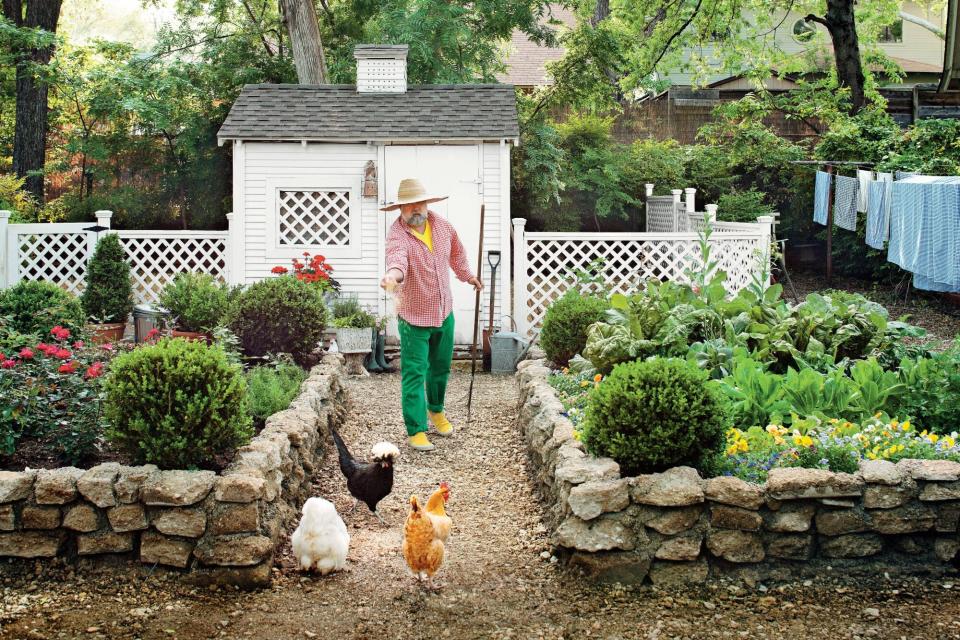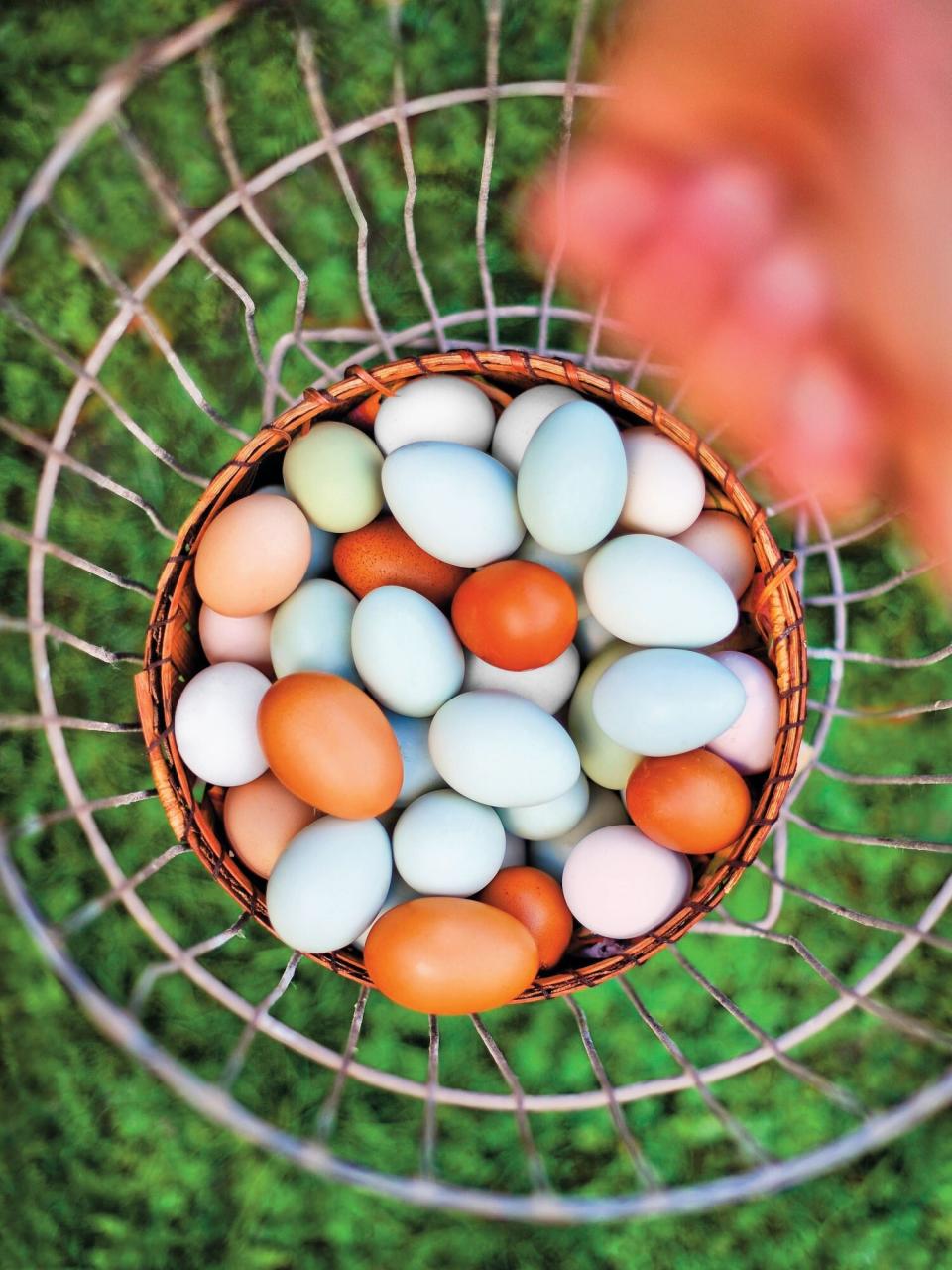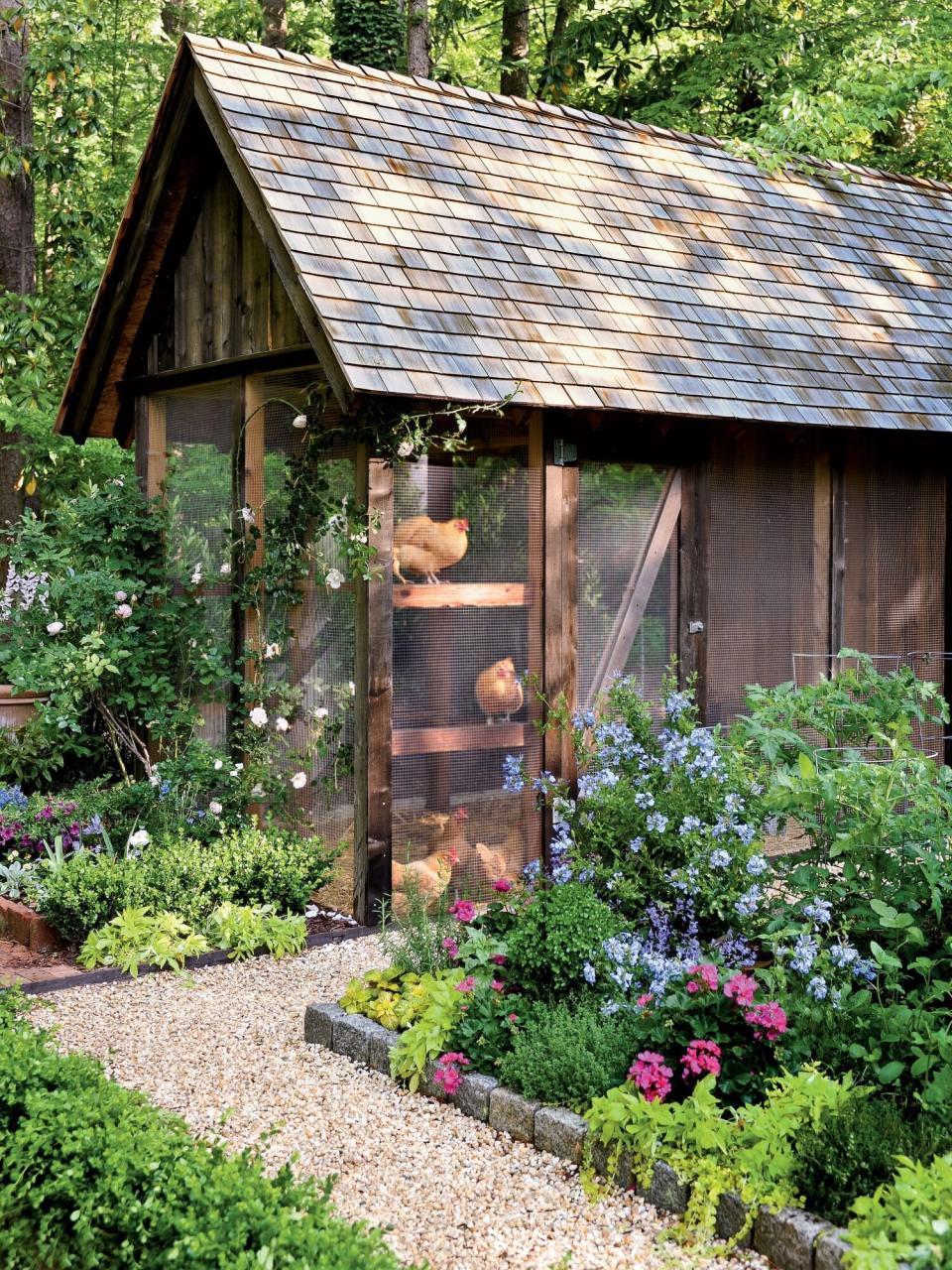Raising Chickens in the South

Rob Brinson Nestled into well-designed gardens, coops have come a long way.
Have a seat, Fido. Step aside, Furball. A challenger to your posts as the South's favorite pets is quickly moving up in the pecking order. For while dogs may fetch and cats may hunt, this critter boasts a talent neither can match: It lays delicious eggs.
Yes, the once-humble chicken is conquering new territory from Texas and Oklahoma to the Carolinas and Virginia. No longer relegated to the farm, backyard chickens are now the rage in cities and burbs, including areas so tony the butlers have servants. It seems like almost every major town boasts a poultry group, in which people from all walks of life gather to talk about raising chickens. Coop tours such as the Funky Chicken Coop Tour (held each April in Austin, Texas) and the Tour D'Coop (held each May in Raleigh, North Carolina) showcase coops ranging from the simple to the sublime, as proud chicken owners crow about their birds.
Mariana Greene, gardening and home editor for The Dallas Morning News, testifies to the escalating fervor for backyard fowl. "I write about chickens in my gardening column only once a month, but that's what my readers clamor for," she says. "When my little runty rooster, Buttercup, died last summer, I received 93 e-mails expressing condolences."
Why is the South so taken with chickens?
You could point to dozens of different reasons, but it pretty much boils down to three things: food, fascination, and family.

Photo: Matthew Benson, Robbie Caponetto So you think of chicken coops only as ugly dirt yards surrounded by wire? Well, think again. Jimmie Henslee built raised beds next to his, pleasing his chickens as well as his neighbors.
1. Fresh Eggs Every Day
The appetite for locally grown food produced by people you know using methods you approve of grows stronger every day. You can't get more local than your own yard. When raising chickens for eggs, meat, or both, nothing goes into your birds that you don't control—no antibiotics, hormones, or genetically modified feed.
Backyard chickens tend to be happier and healthier than factory-farmed ones, because they're often treated as pets, given room, and fed a much more varied and nutritious diet. In addition to chicken feed, owners reward birds with vegetable and fruit scraps from the kitchen. Many, like Jimmie Henslee of Dallas, grow garden greens just for their birds. Chickens allowed to run in the yard also eagerly hunt down protein-rich bugs. Due to these factors, their eggs contain less cholesterol and saturated fat and more vitamins, folic acid, and omega-3 fatty acids than those of caged birds. Their vivid, orange-yellow yolks resemble setting suns.
Fresh, unpasteurized backyard eggs are beyond compare when it comes to flavor. "Even free-range eggs from the market aren't as good," claims Jimmie. "Scrambled eggs and omelets are fluffier and taste more buttery." Backyard eggs are better for baking too. Jimmie remembers when he made his grandmother's recipe for pound cake that called for a dozen eggs. "The cake was so bright yellow, everyone thought I had added food coloring," he says.

Photo: Matthew Benson, Robbie Caponetto Looking for something besides white eggs? Black Copper Marans lay copper-brown eggs, while Ameraucanas lay lovely green, blue, or pink ones.
2. Pick Your Chickens
People collect stamps, coins, fine china, and even beer cans, so why not chickens? With more than 100 recognized breeds, the sheer number of different body types is amazing. Chickens range in size from the 12-ounce Serama to big bruisers such as the 13-pound Jersey Giant. Feathers may be red, blue, gold, orange, black, white, gray, or brown. Rhode Island Reds provide brown eggs, Leghorns bear white eggs, and Ameraucanas can lay blue, green, or even pink ones. Brahma and Cochin chickens flaunt fancy feathered legs. A Silkie looks like a ball of fluff adorned with turquoise earrings.
Chicken personalities vary as much as their colors. They can be affectionate, curious, loyal, adventurous, shy, gregarious, and free-spirited. Some breeds are naturally aggressive, flighty, and hard to tame. Gentle, calm breeds are better for beginners. Jane, a Buff Orpington owned by Carolyn Llorens in Atlanta, follows her around the yard and likes being held. Captain, a Serama rooster and show bird owned by Jason Myrick, commands the spotlight like a circus ringmaster. While waiting to have his portrait made at The Stock Market Country Store in Conyers, Georgia, the gaudy, diminutive bird sits patiently atop a hay bale, looking inquisitively into the faces of all those around. Point the camera at him, though, and he immediately becomes a ham, strutting and posing like a fashion model.

Photo: Matthew Benson, Robbie Caponetto People aren't the only ones who eat chickens. Be sure to line coops with hardware mesh to protect birds from dogs, cats, coyotes, opossums, snakes, and raccoons.
3. Man's Best Friend
Backyard chickens make great additions to the family. Carolyn says they help her husband, Hector, relax after a hard day. "He'll grab a martini, walk out in the yard, and just watch the chickens," she says. "For him, it's total stress relief." Chickens also bond well with other pets. Jimmie's black cat, Benjamin, takes dirt baths with the chickens, sleeps in their nest boxes, and even eats with them.
Perhaps the biggest benefit for families with chickens is the chance to open children's eyes to the cycle of life from egg to chick to hen and back to egg. "It's a very grounding experience for them; they see where life comes from and also where food comes from. They start to realize what an animal goes through to produce food for us," Jimmie explains. "Kids who grow up with chickens learn to be more gentle with creatures. Hopefully, this will lead to more humane treatment for all animals."
How to Get Started
You can find lots of information out there about backyard chickens. Read Storey's Guide to Raising Chickens and Storey's Illustrated Guide to Poultry Breeds (both available from barnesandnoble.com). Visit websites such as backyardchickens.com. Search for "The Chicken Coop" and "Fresh Eggs Daily" on Facebook, or search for "coop designs" on Pinterest. To find a poultry group that meets in your area, visit backyard-poultry.meetup.com.
Check local ordinances to make sure you can keep chickens. They often ban roosters (hens lay eggs without them), limit the number of birds, and specify the distance a coop must be from the street.
Whatever you do, start with a breed that's gentle and well-behaved, doesn't fly, and lays dependably (such as Buff Orpington or Brahma), and you'll be smitten.

